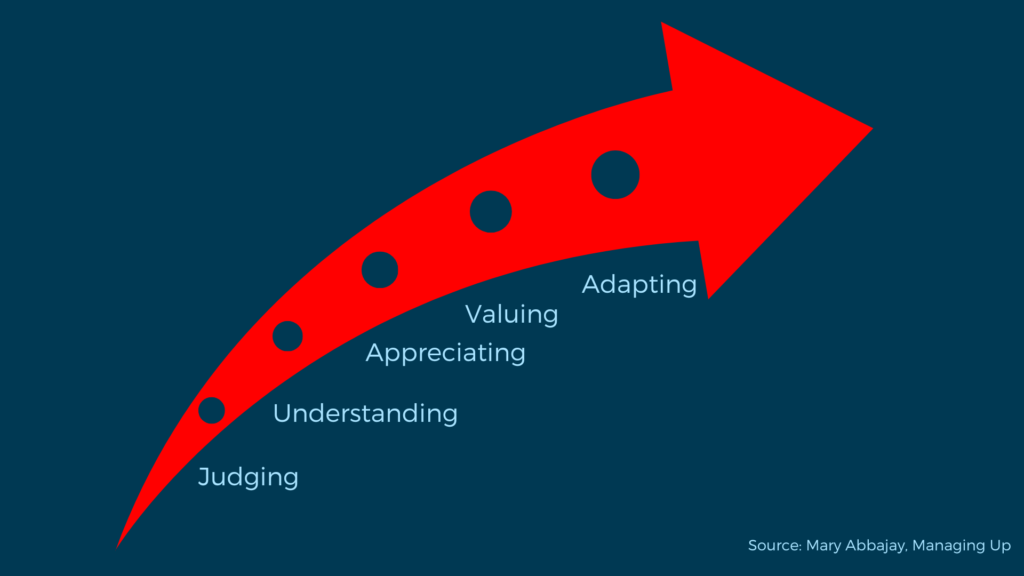
| Do you find yourself navigating the delicate balance of keeping your boss on track? Do you find yourself second-guessing your approach? Do you question the frequency and timing of your communications? Are you still striving to bridge the gap, to understand your executives thinking? You may feel underutilized and undervalued. I’ve seen firsthand the impact these challenges can have. They sap your morale and confidence. It’s a tough road. Showing up day, endeavouring to deepen a relationship that may not feel as cohesive as we’d hope. Navigating These Challenges Requires You To Manage Upwards? The EA/Exec partnership is foundational to YOUR success. It’s the key to you being efficient AND effective. Even more, it makes it more likely that you will be perceived as a talent to be developed.When you are out of step are the timing is clumsy, bruised toes are the inevitable outcome. When it comes to Managing Upwards, my advice is to do so with a blend of empathy, curiosity, and strategic communication. These are more than skills; they’re supercharged pathways to building meaningful professional relationships. Episode 193 of Assist With Impact gives you ideas on how you can manage upwards. I shed light on some groundbreaking thought leadership in this realm from Mary Abbajay. My aim is to empower you with ideas and approaches. Supporting you to navigate your interactions with skill and fostering deeper connections. The Starting Point My philosophy is always to start with curiosity. As Walt Whitman once said “Be curious, not judgmental”.Curiosity is the cornerstone of what it means to manage up effectively.Start by becoming a mindful observer of your own thoughts. It’s not easy, but try to notice when you slip into judgment mode. This awareness is your first victory.Next, shift gears. When you feel judgment creeping in, pause. Dive into understanding instead. Imagine walking in the other person’s shoes. Pay attention to your manager’s preferences. How do they navigate interpersonal relationships and communicate? Three Gold Nuggets From ‘Managing Up’ By Mary Abbajay Mary Abbajay shares how to increasing your insight and adapting your style in her book ‘Managing Up’. Let me summarise three nuggets of gold that I find invaluable. I expand on them in this podcast episode. Gold Nugget #1 – Accepting & Adapting To An Introverted vs. Extroverted Leader Introverted Bosses (Innies): They are reflective and often keep to themselves. This requires you to be proactive in seeking feedback and interaction. They appreciate focused, task-oriented communication.Extroverted Bosses (Outies): Open and communicative, they enjoy sharing thoughts and interacting regularly. They value open communication and listening to their ideas is crucial.Key Takeaway: Adapt your communication style to match your boss’s level of extraversion for better interaction. Gold Nugget #2: Noticing & Aligning Your Support For A Harmonizer vs. Advancers Harmonizers: Focus on team cohesion and workplace happiness. They prefer resolving conflicts amicably and value team well-being.Advancers: Goal-oriented and fast-paced, seeking solutions over discussions. They appreciate direct, solution-focused communication and quick decision-making.Key Takeaway: Recognize whether your boss values harmony or advancement and tailor your approach accordingly. Gold Nugget #3: Dealing with Micromanagers Micromanagers are frequently driven by fear and insecurity, they tend to over-scrutinize work. Building trust is key. Managing Up Strategies: Demonstrate reliability, consistently meet expectations, and over-communicate on work progress to build trust and reduce their need to micromanage.Key Takeaway: Winning the trust of a micromanager involves demonstrating dependability and keeping them informed. Final Thoughts Understanding your boss’s personality type is crucial in fostering a productive working relationship. Adapt your style to suit their preferences. Notice and observe whether you’re dealing with an Innie, an Outie, a Harmonizer, an Advancer, or a micromanager. It can lead to a more harmonious and efficient workplace. Why ‘be curious, not judgmental’? Because it opens doors to understanding, acceptance, and connections we might otherwise miss. As Mary says: “When we come from a place of judgment, we become stuck in our own worldview. When we come from a place of curiosity we expand our range of possibility.” Finally, embrace acceptance. Accept your leader (and people in general) as they are, not as you wish them to be. Acceptance doesn’t mean resignation; it means recognizing our shared humanity. Let’s choose curiosity and empathy. It makes the world a kinder, more interesting place. Increasing Your Impact & Insight Hey, did you know that if you take my advice and put these three tips into action you will be increasing your Leader Insight. And did you know this is one of the five ‘Insight and Impact Zones in the Linchpin Model® that I train and coach assistants in? Join me during February as we explore more practical and tactical tips to support you in deepening your insights and elevating your impact in this area. I am on a mission to supercharge your soft skills, to unlock the full potential of your EA/Exec partnership. There is no limit to what you can achieve when you harness the power of effective communication. Warmest Regards, and here’s to you being the ‘little hinge that swings big doors’, |

Posted in Uncategorized
Looking for something? Search here

Meet Liz
I work with Executive Assistants and Administrative Assistants to deliver the confidence, consistency and career development that transforms them into thriving Linchpin Assistants.
